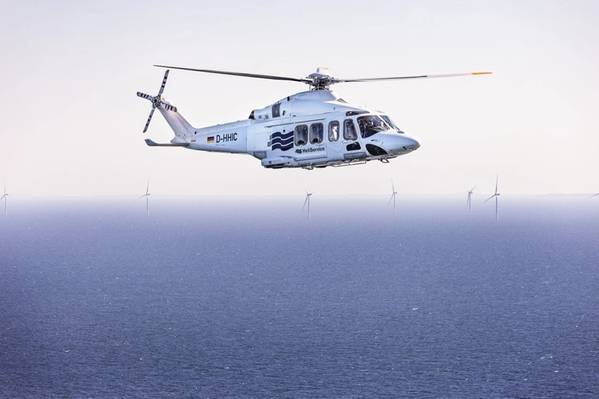
Danish offshore wind turbine maker Vestas will test the use of sustainable aviation fuel (SAF) for helicopters transporting technicians and jack-up vessel crew at the Baltic Eagle Wind Farm in the Baltic Sea.
The helicopters will be partly powered by SAF while traveling to and from Iberdrola's Baltic Eagle wind farm during the construction phase of 50 offshore wind turbines.
SAF is a fuel produced from bio-waste materials such as used cooking oil or tallow. Because SAF can help reduce lifecycle greenhouse gas emissions associated with air travel, it is generally considered a more sustainable alternative to conventional jet fuel.
The pilot project is scheduled to take place until September 2024. Helicopter service provider HeliService, will use helicopters from Leonardo flying on approximately 40% SAF provided by DCC & Shell Aviation Denmark.
A blend rate of 40% SAF is close to the highest possible blend rate permitted today and it is the first time that SAF-fueled helicopters with such a high blend rate are used for an entire part during the construction phase of an offshore wind farm operation.
CO2 savings of approximately 32% per flight are expected compared to using a standard helicopter powered by conventional jet fuel. Vestas will assess the impact of the SAF following the end of the pilot project, the company said.
The initiative is in line with Vestas’ sustainability strategy which includes becoming carbon neutral in our own operations by 2030 and reducing emissions in our supply chain by 45% per MWh generated.
In relative terms, offshore wind projects experience higher CO2-emissions from construction and service operations than onshore wind projects due to the need of vessels and helicopters, and we need to develop new solutions for offshore wind to become carbon neutral.
“This is yet another initiative through which Vestas continues to implement its sustainability strategy. There is a significant need for more sustainable solutions during these wind farms' construction and operation phases. The potential for using SAF in offshore operations is high and we are pleased to further exploit this potential,” said Kieran Walsh, Senior Vice President and Head of Construction at Vestas Northern & Central Europe.